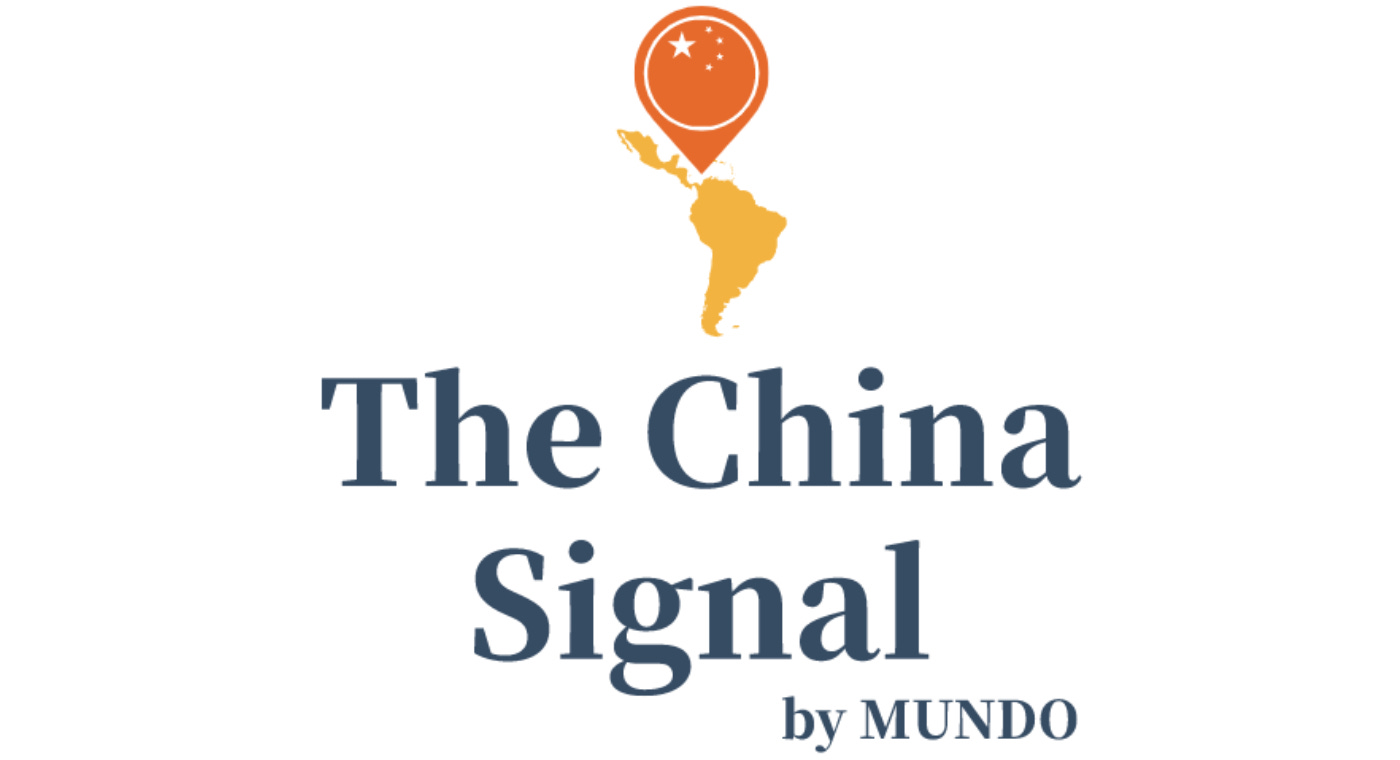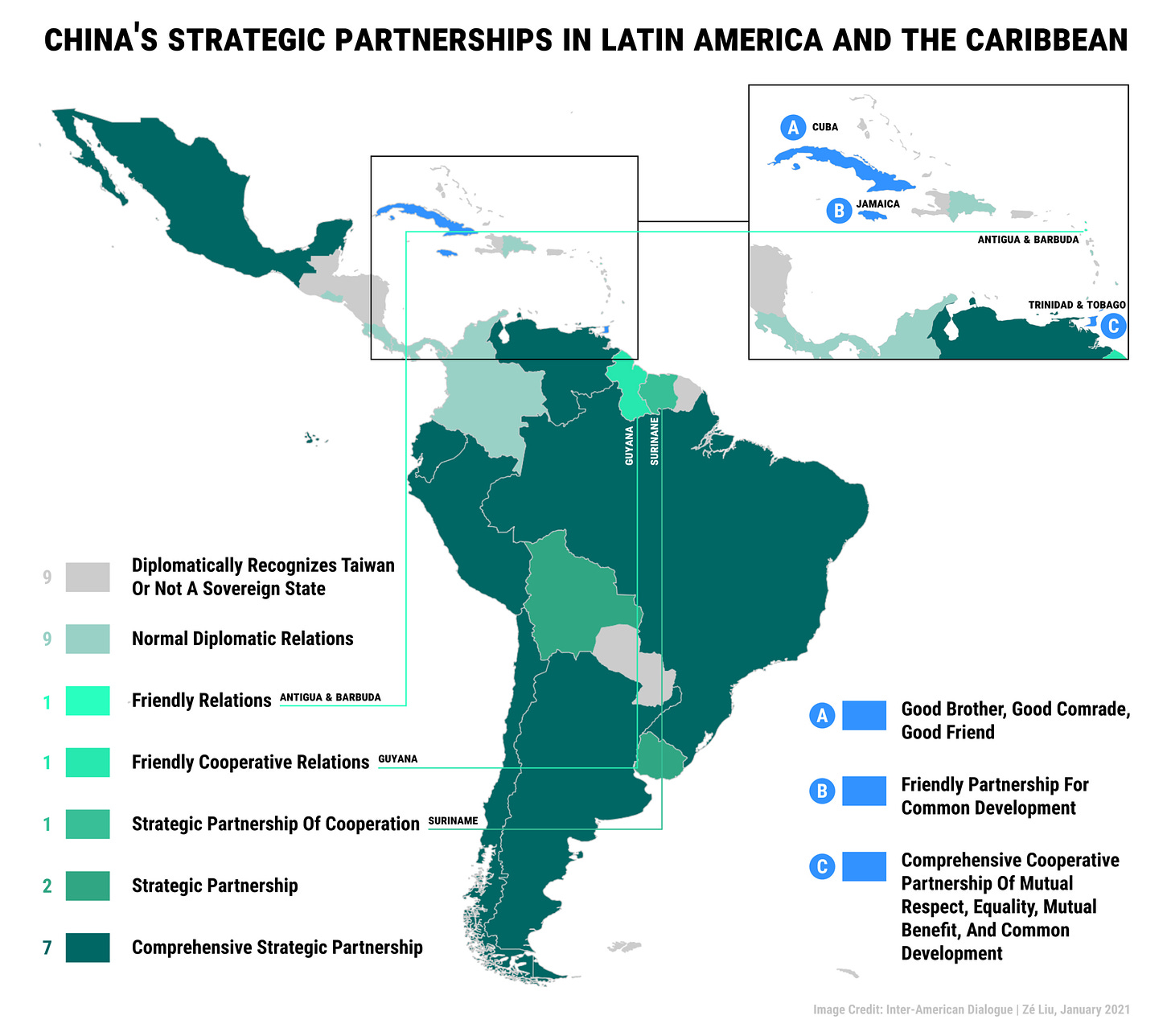The China Signal - February 5
Huawei/5G/Brazil (again), Guyana drops engagement with Taiwan, Argentina signs critical minerals MOU with Jiangsu Jiankang Automobile
G’day, and welcome to The China Signal! This week, Brazil leaves the door open for Huawei to participate in its 5G network, while floating a plan to ring fence a seperate government network; Guyana feels the heat from China, reversing steps toward diplomatic engagement with Taiwan; and Argentina signs an MOU for lithium battery production with China’s Jiangsu Jiankang Automobile.
Welcome to my new readers, it was good to talk with some of you this week.
5G
Brazil
Brazil’s federal government will require winners of an upcoming 5G spectrum auction to build a high security wireless network for its exclusive use, according to an order published late on Friday.
The requirement is one of the new guidelines for the auction the government is planning for 2021.
While the decision does not mention Huawei Technologies Co, it erases the likelihood of banning any company from the auction, which had been a possibility for the Chinese tech giant, a person familiar with the communication ministry’s decision making said.
Companies seeking to build the network for the government’s exclusive use must have equipment suppliers with “transparency and compliance patterns in line with those required by Brazil’s stock market”, according to a statement on the communications ministry website.
The main purpose of the network, which would be managed by state-owned Telebras, would be handling government data, the person said.
The official notice can be found here (in Portuguese).
According to a Huawei official quoted by Reuters, Huawei already owns and controls over 50% of Brazil’s wireless infrastructure.
Remember, Brazil joined the United States’ Clean Network initiative last year. This news is bound to cause tension against this, so let’s see how this ultimately plays out.
China’s Huawei launches second Brazil datacenter - BNamericas - January 28, 2021
China’s Huawei has activated a second datacenter in Brazil, the AZ2, mainly as a backup zone for cloud services offered from its other facility in the country.
In addition to providing greater capacity, the redundancy facility is expected to attract customers concerned with the migration of critical workloads to the cloud, the company said in a statement.
Huawei’s regional cloud business is relatively new, having kicked off with the activation of a datacenter in Chile, in August 2019, followed by datacenters in Brazil, Mexico, Argentina and Peru.
In addition to Brazil, a second datacenter in Chile is expected to come online in coming weeks.
Huawei’s global public cloud business launched in 2017, in China. In May last year, the company raised the segment’s profile to a business unit, matching it in importance with its telecom and smartphone divisions.
Huawei's new Brazil site comes as the world’s major public cloud players, Amazon Web Services (AWS) and Microsoft Azure, are also expanding their cloud footprint in Brazil and Latin America.
Diplomacy
Guyana
A diplomatic backflip in under 24 hours.
Guyana nixes Taiwan office after Beijing criticizes 'mistake' | Reuters - February 3, 2021
Guyana on Thursday abruptly terminated an agreement with Taiwan to open an office in the South American country, hours after China urged Georgetown to “correct their mistake.”
Taiwan’s foreign ministry earlier on Thursday said it had signed an agreement with Guyana on Jan. 11 to open a Taiwan office, effectively a de facto embassy for the island that China claims as its sovereign territory with no right to diplomatic ties.
Guyana’s foreign ministry on Thursday afternoon said it was rolling back the agreement and that it continued to adhere to the “One China” policy.
“The government has not established any diplomatic ties or relations with Taiwan and as a result of the miscommunication of the agreement signed, this agreement has since been terminated,” Guyana’s statement read.
Remember:
China’s CNOOC Ltd is part of a consortium with U.S. oil companies Exxon Mobil Corp and Hess Corp that has discovered more than 8 billion barrels of recoverable crude reserves in the Stabroek block off Guyana’s coast, turning the country into a new energy hotspot.
Taiwan has blamed Chinese “bullying” for Guyana’s decision to revoke a deal for the island to open a representative office in the South American country, saying it had tried without success to get Guyana to change its mind.
Taiwan had already begun initial operations at the office, in effect a de facto embassy, last month.
Taiwan’s foreign ministry said because of Chinese pressure Guyana had “unilaterally” decided to back out of the deal, and Taiwan expressed deep regret it was unable to convince them to reverse the decision.
“We express our strongest dissatisfaction and condemnation of the Chinese government once again bullying and compressing Taiwan’s international space and Taiwan’s participation in international affairs,” the ministry said.
Taiwan only has formal diplomatic relations with 14 countries, but four of these are in the Caribbean. TCS reader Margaret Myers of the Inter-American Dialogue recently published an excellent graphic of China’s country-level relationship throughout Latin America and the Caribbean.
Critical Minerals / Electric Vehicles
Argentina
“Government advances in an agreement with China to boost the country’s electric vehicle industry”
~Paraphrased Translation~
The Minister of Productive Development, Matías Kulfas, and the Ambassador to the People's Republic of China, Sabino Vaca Narvaja, held a virtual meeting with executives of the Jiangsu Jiankang Automobile to sign an agreement that will boost the country’s electric vehicle industry. Argentina will industrialise its lithium reserves, as one of the largest in the world, as indicated to Infobae from the Argentina’s embassy in China.
The initiative follows a recent announcement by President Alberto Fernández at the World Economic Forum, where he stated Argentina’s ambitions to play a leading role in electromobility, backed by a robust legal framework currently under development.
El Ministro de Desarrollo Productivo, Matías Kulfas, y el Embajador ante la República Popular China, Sabino Vaca Narvaja, mantuvieron un encuentro virtual con directivos de la Jiangsu Jiankang Automobile para firmar un acuerdo que impulsará la industria de vehículos eléctricos en el país. De esta forma, Argentina podrá industrializar el litio que posee en una de las reservas de mayor extensión a nivel mundial, según indicaron a Infobae desde la Embajada de Argentina en China.
La iniciativa se inscribe en el marco de lo anunciado recientemente por el presidente Alberto Fernández en el Foro de Davos, donde afirmó que existen condiciones para que Argentina asuma un rol de liderazgo en materia de electromovilidad, con un marco legal robusto que está en pleno diseño.
Note:
The agreement is an MOU only.
Jiangsu Jiankang Automobile is owned by the Guoxuan Group.
The MOU mentions the intention to build lithium battery and urban bus factories to supply electric vehicles to Argentina and neighbouring countries.
Also, I’m sorry to call it out, but the first half of this article is a near full copy of this China Daily article. I’m not sure who “inspired” who.





